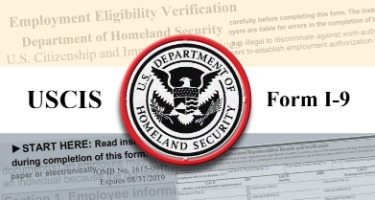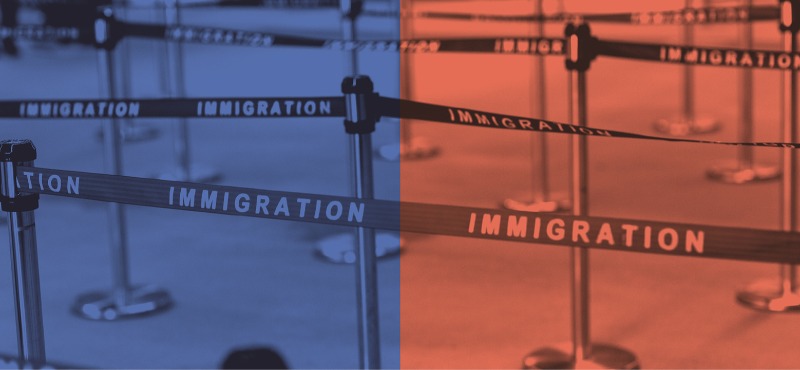President Trump’s first year in office brought much discussion throughout the country, and in the area of immigration, this was no exception. While Congress has not seriously considered reform to current immigration laws in years, President Trump has made significant changes in his administration that affect immigrants from all walks of life. This has created a sense of uncertainty for immigrants, their families, employers, lawyers, and government officials.
First, while his executive orders for travel bans were challenged in courts, finally, in December 2017, the U.S. Supreme Court allowed specific bans for non-U.S. citizens from several, mostly predominately Muslim, countries. The travel bans are still being challenged in the courts, and the current ban does not completely prohibit all visas for foreign nationals from Iran, Libya, Syria, Yemen, Somalia, Chad, North Korea, and Venezuela. Nevertheless, many will be banned from immigrating permanently and others will be barred from working, studying, or visiting the United States.
Second, under President Trump’s focus on “Buy American, Hire American,” the H-1B professional worker visa category has come under increased scrutiny. The H-1B visa program has been examined over the years and is one of the more regulated types of visa programs under the U.S. immigration system. However, now the U.S. Citizenship and Immigration Services (the “benefits” agency within the U.S. Department of Homeland Security) has issued a significantly higher number of requests for evidence for pending H-1B visa petitions, which has caused delays in processing and a higher rate of denials.
This is affecting U.S. companies’ ability to hire the best qualified employees to promote their services and products.
Third, the administration has terminated Temporary Protected Status (TPS) for Haitians, Nicaraguans, and Salvadorans, allowing for a phasing out period. TPS is a humanitarian program giving protected status and work permits to foreign nationals in the United States due to civil unrest or natural disasters in their own countries. The future of TPS for other countries, especially Honduras, is uncertain. These programs affect thousands of immigrants annually, and many of them have possessed TPS for more than 10 years.
Fourth, DACA, or Deferred Action for Childhood Arrivals, is another high-profile humanitarian program that the administration has terminated. DACA also provides protected status and work permits to foreign nationals but is based on the fact that these immigrants were brought to the country as children by their parents and they pursued education in the United States. This program is being phased out, affecting thousands of young people who have grown up in the United States and many who have achieved U.S. Master’s degrees and work in professional jobs.
Fifth, under President Trump’s administration, both the deportation sections and the legal sections of the U.S. Immigration and Citizenship Enforcement (ICE) agency (also part of the U.S. Department of Homeland Security) are prioritizing and addressing cases differently. Apart from the immigration courts’ jurisdiction, ICE deportation sections have been instructed not to prioritize deportations against non-U.S. citizen criminals but to target any and all undocumented immigrants. This has resulted in higher arrest rates for non-criminal immigrants. Within the immigration courts’ jurisdiction, ICE attorneys, many times referred to as the “prosecutors” in immigration court proceedings, were able to negotiate with private bar attorneys representing foreign nationals in the past. These negotiations usually resulted in more streamlined processing of immigration court cases.
Now ICE attorneys have been instructed not to negotiate and to more or less “fight” every case, even those that the immigration judge will likely approve.
Yet while it is clear that President Trump has impacted how immigration law is currently being practiced and how immigrants are being affected, he is not the only president who has impacted immigration policy and practice in one way or other. For example, President Obama’s administration created humanitarian programs, such as DACA and the Central American Minors (CAM) refugee program, now terminated by President Trump’s administration, which assisted specific immigrant populations while enforcing the deportations of thousands of other immigrants.
With three more years of the Trump presidency and the president’s continued call for a border wall and tougher immigration policies, we should expect more changes in immigration policy and practice from the executive branch. It will be of much interest to see how the administration affects Congress—will we see comprehensive immigration reform from Congress or just more specific, targeted programs and orders from President Trump?
----------------------------
Angelique Montano is board certified in immigration and nationality law by the Texas Board of Legal Specialization. She has practiced immigration law since 2001 and recently opened her own firm. She works on a variety of immigration cases, including immigration court proceedings, family-based and employment-based immigration, and employer compliance issues.

































